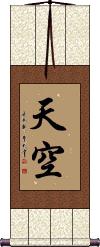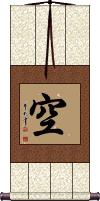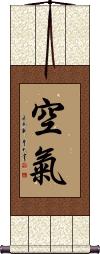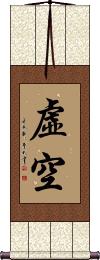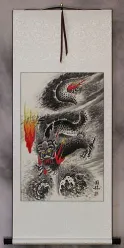Many custom options...
And formats...

Not what you want?
Try other similar-meaning words, fewer words, or just one word.
Sky Air Ether Space in Chinese / Japanese...
Buy a Sky Air Ether Space calligraphy wall scroll here!
Personalize your custom “Sky Air Ether Space” project by clicking the button next to your favorite “Sky Air Ether Space” title below...
Sky / Air / Ether / Space
Sky / Ether / Void / Emptiness / Unreality
(Used in Japanese version of five elements)
空 is a single character that means empty, void, hollow, vacant, vacuum, blank, nonexistent, vacuity, voidness, emptiness, non-existence, immateriality, unreality, the false or illusory nature of all existence, and being unreal.
In the Buddhist context, this relates to the doctrine that all phenomena and the ego have no reality but are composed of a certain number of skandhas or elements, which disintegrate. The void, the sky, space. The universal, the absolute, complete abstraction without relativity. The doctrine further explains that all things are compounds, or unstable organisms, possessing no self-essence, i.e. are dependent, or caused, come into existence only to perish. The underlying reality, the principle of eternal relativity, or non-infinity, i.e. śūnya, permeates all phenomena making possible their evolution.
From Sanskrit and/or Pali, this is the translation to Chinese and Japanese of the title śūnya or śūnyatā.
In Japanese, when pronounced as “ron” (sounds like “roan”) this can be a given name. It should be noted that this Kanji has about 5 different possible pronunciations in Japanese: kuu, kara, sora, ron, and uro. 空 is also an element in the Japanese version of the five elements.
Air / Atmosphere
空氣 means air or atmosphere in Chinese, Japanese Kanji, and old Korean Hanja.
This is an unusual title for an Asian calligraphy wall scroll, but many of our western customers have requested it.
![]() While 空氣 is common in Chinese and Korean Hanja (and ancient Japanese Kanji); please note that in modern Japanese, the second character is written as 気, with slightly fewer strokes. If you want the modern Japanese version, please click on the character to the right. Both versions are understood by native Chinese, Japanese, and many (but not all) Korean people. You should choose the appropriate version based on the intended audience for your calligraphy artwork.
While 空氣 is common in Chinese and Korean Hanja (and ancient Japanese Kanji); please note that in modern Japanese, the second character is written as 気, with slightly fewer strokes. If you want the modern Japanese version, please click on the character to the right. Both versions are understood by native Chinese, Japanese, and many (but not all) Korean people. You should choose the appropriate version based on the intended audience for your calligraphy artwork.
Nothingness / Empty / Void
虛空 means empty space, empty sky, or void.
In the Buddhist context, it can mean “emptiness of the material world.” This can also be used as an adjective to modify other words with a meaning of unreal or insubstantial.
Sky / Void
虛空 means void, hollow, empty, space, sky, atmosphere, heaven, or ether.
虛空 is the Chinese and Japanese version of the Sanskrit word ākāśa (or akasa / akash) which, beyond the sky or space meaning can be the immaterial universe behind all phenomena in the Buddhist context.
This in-stock artwork might be what you are looking for, and ships right away...
Not the results for sky air ether space that you were looking for?
Below are some entries from our dictionary that may match your sky air ether space search...
| Characters If shown, 2nd row is Simp. Chinese |
Pronunciation Romanization |
Simple Dictionary Definition |
五行 see styles |
wǔ xíng wu3 xing2 wu hsing gogyou / gogyo ごぎょう |
More info & calligraphy: Five Elements(1) (See 五大・ごだい・1) the five elements (in Chinese philosophy: wood, fire, earth, metal and water); the five phases; wu xing; (2) {Buddh} five practices of the Bodhisattvas; (3) (See 六信五行) the five pillars of Islam; (surname, given name) Gogyou The five lines of conduct. I. According to the 起信論 Awakening of Faith they are almsgiving; keeping the commandments; patience under insult; zeal or progress; meditation. II. According to the 涅槃經 Nirvana Sutra they are saintly or bodhisattva deeds; arhat, or noble deeds; deva deeds; children's deeds (i. e. normal good deeds of men, devas, and Hinayanists); sickness conditions, e. g. illness, delusion, etc.; — into all these lines of conduct and conditions a Bodhisattva enters. III. The five elements, or tanmātra— wood, fire, earth, metal, and water; or earth, water, ire, air, and ether (or space) as taught by the later Mahāyāna philosophy; idem 五大. |
虛空 虚空 see styles |
xū kōng xu1 kong1 hsü k`ung hsü kung kokū |
More info & calligraphy: Nothingness / Empty / Voidśūnya; empty, void, space; ākāśa, in the sense of space, or the ether; gagana, the sky, atmosphere, heaven; kha, space, sky, ether, 虛 is defined as that which is without shape or substantiality, 空 as that which has no resistance. The immaterial universe behind all phenomena. |
佉 see styles |
qū qu1 ch`ü chü kya |
surname Qu Translit. kha, also khya, ga, gha, khu, khi; cf. 呿, 喀, 吃, 呵, 珂, 恪, 轗; it is used to represent 虛空 space, empty. Skt. khainter alia means "sky", "ether". |
大 see styles |
dài dai4 tai yutaka ゆたか |
see 大夫[dai4 fu5] (pref,adj-na,n) (1) large; big; great; huge; vast; major; important; serious; severe; (prefix) (2) great; prominent; eminent; distinguished; (suffix) (3) -sized; as big as; the size of; (suffix noun) (4) (abbreviation) (See 大学・1) university; (5) large (e.g. serving size); large option; (6) (abbreviation) (See 大の月) long month (i.e. having 31 days); (given name) Yutaka Maha. 摩訶; 麼賀. Great, large, big; all pervading, all-embracing; numerous 多; surpassing ; mysterious 妙; beyond comprehension 不可思議; omnipresent 體無不在. The elements, or essential things, i.e. (a) 三大 The three all-pervasive qualities of the 眞如 q.v. : its 體, 相 , 用 substance, form, and functions, v. 起信論 . (b) 四大 The four tanmātra or elements, earth, water, fire, air (or wind) of the 倶舍論. (c)五大 The five, i.e. the last four and space 空, v. 大日經. (d) 六大 The six elements, earth, water, fire, wind, space (or ether), mind 識. Hīnayāna, emphasizing impersonality 人空, considers these six as the elements of all sentient beings; Mahāyāna, emphasizing the unreality of all things 法空, counts them as elements, but fluid in a flowing stream of life, with mind 識 dominant; the esoteric sect emphasizing nonproduction, or non-creation, regards them as universal and as the Absolute in differentiation. (e) 七大 The 楞嚴經 adds 見 perception, to the six above named to cover the perceptions of the six organs 根. |
七大 see styles |
qī dà qi1 da4 ch`i ta chi ta shichidai |
Earth , water, fire, wind, space (or ether), sight, and perception 地, 水, 火, 風, 空, 見, 証識; cf. 大, 五大and 六境; 見大 and 六根; 識大 and 六識. |
五智 see styles |
wǔ zhì wu3 zhi4 wu chih gochi ごち |
(place-name, surname) Gochi The five kinds of wisdom of the 眞言宗 Shingon School. Of the six elements 六大 earth, water, fire, air (or wind), ether (or space) 曇空, and consciousness (or mind 識 ), the first five form the phenomenal world, or Garbhadhātu, the womb of all things 胎藏界, the sixth is the conscious, or perceptive, or wisdom world, the Vajradhātu 金剛界, sometimes called the Diamond realm. The two realms are not originally apart, but one, and there is no consciousness without the other five elements. The sixth element, vijñāna, is further subdivided into five called the 五智 Five Wisdoms: (1) 法界體性智 dharmadhātu-prakṛti-jñāna, derived from the amala-vijñāna, or pure 識; it is the wisdom of the embodied nature of the dharmadhātu, defined as the six elements, and is associated with Vairocana 大日, in the centre, who abides in this samādhi; it also corresponds to the ether 空 element. (2) 大圓鏡智 adarśana-jñāna, the great round mirror wisdom, derived from the ālaya-vijñāna, reflecting all things; corresponds to earth, and is associated with Akṣobhya and the east. (3) 平等性智 samatā-jñāna, derived from mano-vijñāna, wisdom in regard to all things equally and universally; corresponds to fire, and is associated with Ratnasaṃbhava and the south. (4) 妙觀察智 pratyavekṣaṇa-jñāna, derived from 意識, wisdom of profound insight, or discrimination, for exposition and doubt-destruction; corresponds to water, and is associated with Amitābha and the west. (5) 成所作智 kṛtyānuṣṭhāna-jñāna, derived from the five senses, the wisdom of perfecting the double work of self-welfare and the welfare of others; corresponds to air 風 and is associated with Amoghasiddhi and the north. These five Dhyāni-Buddhas are the 五智如來. The five kinds of wisdom are the four belonging to every Buddha, of the exoteric cult, to which the esoteric cult adds the first, pure, all-refecting, universal, all-discerning, and all-perfecting. |
六大 see styles |
liù dà liu4 da4 liu ta rokudai ろくだい |
{Buddh} the six elements (earth, water, fire, wind, void, and consciousness); (place-name) Rokudai The six great or fundamental things, or elements — earth; water; fire; wind (or air); space (or ether); and 識 mind, or perception. These are universal and creative of all things, but the inanimate 非情 are made only of the first five, while the animate 有情 are of all six. The esoteric cult represents the six elements, somewhat differently interpreted in the garbhadhātu and vajradhātu. Also 六大界. |
無爲法 无为法 see styles |
wú wéi fǎ wu2 wei2 fa3 wu wei fa mui hō |
asaṃskṛta dharmas, anything not subject to cause, condition, or dependence; out of time, eternal, inactive, supra-mundane. Sarvāstivādins enumerate three: ākāśa, space or ether; pratisaṃhyā-nirodha, conscious cessation of the contamination of the passions; apratisaṃhyā-nirodha, unconscious or effortless cessation. |
衞世師 衞世师 see styles |
wèi shì shī wei4 shi4 shi1 wei shih shih Eiseishi |
Vaiśeṣika; derived from viśeṣa, characteristic, individuality, particularity or individual essence. M.W. Also 鞞世師 (or 鞞思迦); 吠世史迦; 勝論宗 An atomistic school founded by Kaṇāda. Like the Saṅkhya philosophy it taught a dualism and an endless number of souls, also by its doctrine of particularity or individual essence maintained 'the eternally distinct or sui generis nature of the nine substances' (see below), 'of which the first five including mind are held to be atomic.' M.W. The interaction of these with the six mentioned below produces cosmic evolution. It chiefly occupied itself, like the orthodox Nyāya philosophy, with the theory of knowledge, but it differed by distinguishing only six categories of cognition 六諦, viz. substance, quality, activity, species, distinction, and correlation, also a seventh of non-existence, and nine substances possessed of qualities, these 九陰 being: the five elements, air, fire, water, earth, ether, together with time, space, spirit (manas), and soul (ātman). Cf. Keith, Indian Logic and Atomism, and Dasgupta, History of Indian Philosophy. |
阿迦奢 see styles |
ā jiā shē a1 jia1 she1 a chia she akasha |
ākāśa, the sky space, the air, ether, atmosphere. |
陀羅驃 陀罗骠 see styles |
tuó luó biāo tuo2 luo2 biao1 t`o lo piao to lo piao darahyō |
dravya, the nine 'substances' in the nyāya philosophy, earth, water, fire, air, ether 空, time, space 方, soul 神, and mind 意. |
阿卑羅吽欠 阿卑罗吽欠 see styles |
ā bēi luó hǒu qiàn a1 bei1 luo2 hou3 qian4 a pei lo hou ch`ien a pei lo hou chien a hi ra ku ketsu |
a-vi-ra-hūm-kham, (or āḥ-vi-ra-hūm-kham the Shingon 'true word' or spell of Vairocana, for subduing all māras, each sound representing one of the five elements, earth, water, fire, wind (or air), and space (or ether). Also, 阿毘羅吽欠 (or 阿尾羅吽欠 or阿尾羅吽劍 or阿毘羅吽劍); 阿味囉 M020011欠. |
The following table may be helpful for those studying Chinese or Japanese...
| Title | Characters | Romaji (Romanized Japanese) | Various forms of Romanized Chinese | |
| Sky Air Ether Space | 天空 | ten kuu / tenkuu / ten ku | tiān kōng tian1 kong1 tian kong tiankong | t`ien k`ung tienkung tien kung |
| Sky Ether Void Emptiness Unreality | 空 | kuu / kara / sora / ron ku / kara / sora / ron | kōng / kong1 / kong | k`ung / kung |
| Air Atmosphere | 空氣 空气 / 空気 | kuu ki / kuuki / ku ki | kōng qì / kong1 qi4 / kong qi / kongqi | k`ung ch`i / kungchi / kung chi |
| Nothingness Empty Void | 虛空 虚空 | kokuu / koku | xū kōng / xu1 kong1 / xu kong / xukong | hsü k`ung / hsükung / hsü kung |
| Sky Void | 虛空 虚空 | kokū | xū kōng / xu1 kong1 / xu kong / xukong | hsü k`ung / hsükung / hsü kung |
| In some entries above you will see that characters have different versions above and below a line. In these cases, the characters above the line are Traditional Chinese, while the ones below are Simplified Chinese. | ||||
Successful Chinese Character and Japanese Kanji calligraphy searches within the last few hours...
